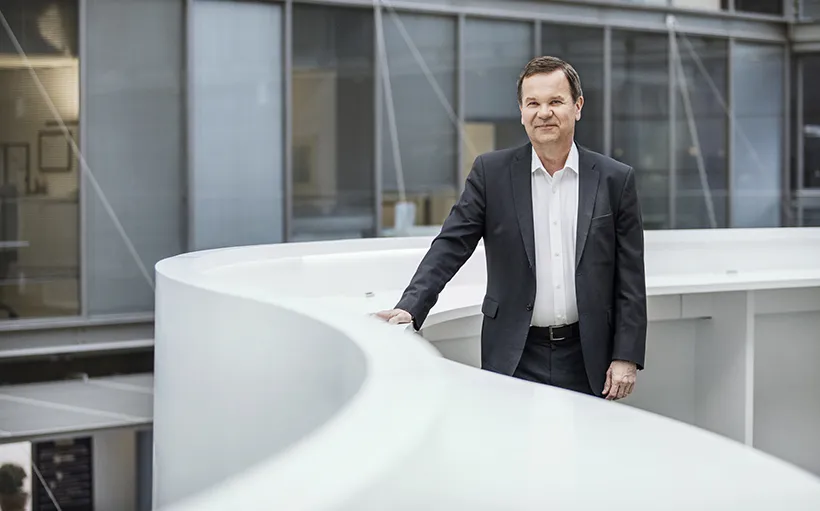Finland needs exports – and unprecedented expertise

The Finnish export industry will prosper in the future, too. Finnvera’s CEO Pauli Heikkilä believes that it is essential to increase SMEs’ export trade, which in turn requires the strengthening of international financing and business expertise. According to him, Finnvera accompanies Finnish enterprises on their journey to the international market.
Finland has always offered excellent products and services. This is the opinion of Pauli Heikkilä, the CEO of Finnvera, the State’s export credit agency and specialised financing company, who has a firm belief both in Finnish exports and in enterprises.
“The founding of Finnvera took place in the middle of the Internet bubble, followed by growth driven by China. In the mid-2000s, virtually anything could be sold in Finland, too,” says Heikkilä, who was appointed Finnvera’s CEO in 2005.
Sales were boosted by brilliant technology pioneers such as Nokia, which gave Finland a generous head start in the field of innovation. Since then, the set-up has changed and novel approaches are needed.
“Other countries have already matched us when it comes to technological expertise. Consequently, Finland should take things to the next level. What is needed is something new and ambitious,” comments Heikkilä.
There is a lot of work to be done in the field of exports, although the real value of both exposure for export credit guarantees and the balance sheet total has grown sevenfold during Finnvera’s 20-year history. However, the goal of the State’s export credit agency has not been to grow but to help enterprises manage on their own and become international. Growth results from the financial crisis and the subsequent regulatory changes in the financial sector, which have influenced banks’ business choices.
“Finland is a small and open economy. Export industry will always be needed to pay for imports. Nearly 40 per cent of Finland’s GDP is generated by exports,” Heikkilä reminds us.
"Other countries have already matched us when it comes to technological expertise. Consequently, Finland should take things to the next level. What is needed is something new and ambitious, comments Pauli Heikkilä.
"
Finnvera’s basic task will remain unchanged
The background of a mathematician and the heart of a problem solver. Both are useful in the position of a CEO who guides financing decisions.
“Numbers have always interested me and, after all, financing is mathematics,” says Heikkilä, whose positions before Finnvera include Digita’s Managing Director and Tekes’ Technology Director.
Heikkilä estimates that one of Finnvera’s future challenges is to encourage an increasing number of SMEs to enter the international market in the footsteps of large corporates. Value generated by SMEs accounts for only 15 per cent of the Finnish export industry.
“A total of 85 per cent of exports comes from large corporates, which are few and far between. If we can increase the share of SMEs, that would already be quite something.”
In his earlier positions, Heikkilä made decisions on the other side of the table.
Acting as a representative of large corporates has given him more perspective, and nowadays, he is of course capable of identifying more easily with enterprises and their efforts.
“Maybe I can spot shortcomings in plans more easily because I have been in the same situation myself,” Heikkilä chuckles.
Finnish enterprises still need consultation and sparring in internationalisation, especially when uncertainty in the world economy is increasing. This is a basic task that Finnvera will not abandon.
“Along with bank regulations and the resulting ripple effects, the content of our operations may have changed but the core remains unchanged – we accompany Finnish enterprises on their journey to the international market.”
Market homework needs to be done
Finland is considered a favourable environment for entrepreneurship and internationalisation, thanks to the country’s calm political atmosphere and predictable conditions for entrepreneurship, among other things. But despite advantages such as the stable atmosphere and the high-quality education system, internationalisation is challenging for many enterprises.
In general, potential stumbling blocks on Finnish enterprises’ path to internationalisation include Finland’s little-spoken language and location far from significant export markets, such as the United States and Asia.
“Austria is in the same size category as Finland, but they have the big German market as their neighbour. Their prerequisites for export trade are better because they speak one of the main languages in Europe,” comments Pauli Heikkilä.
As a result of Finland’s built-in characteristics, the country’s entrepreneurs must find alternative means for competing with enterprises that have much larger markets as their springboard. This requires the enterprises to carry out traditional strategic planning already at early stages.
“Enterprises must do their homework diligently and anticipate the future already when launching their business. When the prerequisites for operating in a market are investigated, the outcome may even be that the market in question is not suitable after all. In that case, the strategy must be re-thought.”
"The content of our operations may have changed but the core remains unchanged – we accompany Finnish enterprises on their journey to the international market.
"
New expertise through cooperation
Over the years, Finland has witnessed success stories both in traditional industries and in software development. Pauli Heikkilä does not believe that there exists a pattern or recipe for global success. Instead, success may occur in unexpected fields.
“Fortunately, there have been a few enterprises that have quickly grown into billion-euro businesses. We just need many more positive exceptions like this.”
According to Heikkilä, the operating conditions of Finnish enterprises depend on cooperation among public bodies, higher education institutions, enterprises and providers of financing. How does this cooperation help enterprises on their journey? The first step is finding common guidelines.
“In my opinion, educational institutions could offer more instruction in business law, for instance, to ensure international regulations and agreement negotiations would not come as a surprise,” says Heikkilä.
When it comes to financing, there is already sparring available to Finnish enterprises. Together with banks and credit insurers, Finnvera and the Chambers of Commerce organise export trade financing tours, with the aim of introducing different financing options to Finnish enterprises in order to facilitate international trade.
“On this tour, we help SMEs that are, for example, at risk of having important export transactions fall through only because different risk management and financing solutions are not familiar enough.”
Pauli Heikkilä regards the excellent products of Finnish enterprises as an absolute trump card. Complementing the product selection with appropriate business expertise gives enterprises a higher profile in international arenas.
“We need new entrepreneurship in Finland. In each sector, there certainly are examples of success, but the impact can only be seen when the total number of enterprises changes. We want to increase this total number.”
Text: Kristiina Äikäs
Photo: Heidi Strengell
